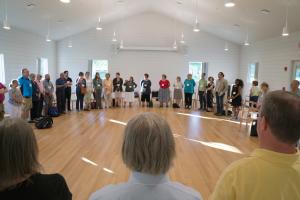The Healing Power of Community: Lament and Doxology at the ISM’s Congregations Project Conference
 Daniel L. Reid, MDiv ‘17
Daniel L. Reid, MDiv ‘17
Early in the Institute of Sacred Music’s Congregations Project Conference, Don Saliers told of a time when a couple approached him after a workshop on the Psalms and asked him why he focused so much on the dark, negative aspects.of these biblical texts. “We don’t want to hear about those things in church!” they complained. Saliers, the William R. Cannon Distinguished Professor Emeritus of Theology and Worship at Emory’s Candler School of Theology, noted that their comment demonstrated an attitude held by many people who are not equipped to handle traumatic events and thus seek to avoid mention of them. But the comment also showed the importance of addressing such unease by asking “How might the Psalms be a resource that equips us to handle violence and trauma?”
Throughout the conference, which ran from June 13 through June 15 at Yale University’s Sterling Divinity Quadrangle, nationally prominent musicians, ministers, and theologians addressed issues and questions surrounding the conference title: “When Dancing Turns to Mourning: Worshipping God in the Face of Violence.” How can one worship a supposedly benevolent God when violence has been committed against his or her person? How might wise congregational leaders respond to traumatic events in the hearts of their communities? And what resources for handling and healing the wounds of violence are available in Christian traditions of worship, music, and art? One possible answer emerged at several points: worshiping together, in community, needs to be an important part of any healing that might occur.
Truth-telling is an indispensable part of Christian worship, Saliers insisted; yet “many congregations,” he claimed, “are conspicuously devoid of truth-telling.” The Psalter provides a remedy for silence about the difficult and traumatic events of life. Alongside the Psalms of praise, or the doxologies, there exists an entire corpus of lament Psalms, poems of wailing and gnashing of teeth in the face of tremendous suffering. Sometimes, lament and doxology exist in the same Psalm, such as Psalm 43, which was recited several times throughout the conference. “How can you have authentic doxology without naming what prevents that doxology?” Saliers asked. The Psalms, like our lives, oscillate between lament and doxology, drawing the worshipping community in to a more authentic encounter of God.
Other conference lectures and discussions amplified this basic claim. Perhaps most moving and convincing of all, however, was the hymn festival held on the evening of June 13, where songs of lament and doxology were both given full expression. The Festival presented an opportunity for participants not only to sing together but also to experience the healing power of a community gathered to worship God in the face of violence. With many skilled singers in attendance, organist John Ferguson of St. Olaf College was often able to drop out completely and let the large congregation sing in harmony yet without accompaniment. The voices resounding together in Marquand Chapel provided a powerful metaphor for the strength of a united yet diverse community of worshippers. Furthermore, brief reflections from many conference speakers explored the hymn festival’s theme, “How Can I Keep from Singing?” I did indeed feel (and I think others did too), that we cannot help but sing God’s praises, even in the face of violence. In a high point that built upon an earlier lecture from Beverly Lapp, Professor of Music at Goshen College, the whole congregation sang, without rehearsal, a fast-moving version of the Old Hundredth Doxology, jumping right into the Mennonite tradition of unaccompanied four-part singing. The whole evening provided a powerful testimony to the healing and restorative power of community: in the midst of an uncertain and often violent time, the world felt right again as all those present sang those familiar words, “Praise God from whom all blessings flow…”